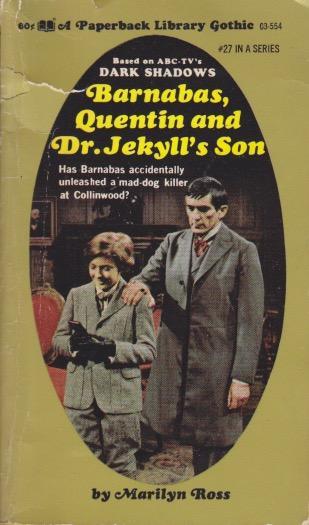
W. E. D. (“Marilyn”) Ross was a journeyman writer. Prolific, he produced more than 300 pot-boilers, and he only started writing at mid-life, which kind of lends hope to me. (He, however, didn’t always pay attention to literary niceties.) I’ve made a determined effort, over the past decade or so, to collect and read all of his Dark Shadows novels. These aren’t great literature, and I generally have to space them out to recover from them. I just finished number 27 (of 32), Barnabas, Quentine and Dr. Jekyll’s Son. Although I watched Dark Shadows as a child, it’s pretty clear that my cosmology of Collinwood was primarily shaped by Ross. Living in an area without a regular bookstore, and without the cash to regularly buy books, I found what volumes I could at Goodwill and read them avidly.
Barnabas, Quentine and Dr. Jekyll’s Son is now a rather rare item on the used market. It’s pretty clear that as Ross went on and on in the gothic fiction genre, he tried new things and these generally improved his work. This story, set in the past, involves Dr. Jekyll’s grown son accompanying Barnabas Collins to Maine in order to escape his father’s reputation and, as a sidebar, to try to cure Barnabas of his vampire curse. This means that one of the Collins girls, Emily in this instance, falls in love with Jekyll rather than Barnabas. It also marks the point at which Ross tries to make it clear that both Barnabas and Quentin are good guys, but being under their own curses, they have to follow their vampire and werewolf natures, respectively.
I think I may have read this one as a child. Although each book was stamped with its number in the series, I was dependent on when my mother decided to go to Goodwill and what they happened to have on hand in their book bin. Some scenes from this book came back to me in the reading—although it was perhaps forty or more years ago—and one of the most important of these was one where Barnabas and Quentin collaborated on capturing the criminal. Among the true fans of the series, they are known as the immortals (and Quentin isn’t always a werewolf), and they revisit Collinwood over the centuries. Quentin can be both good and evil, but Barnabas is generally a sympathetic character. Dr. Jekyll’s son isn’t such a strange guest at Collinwood, and the stories do seem to have improved over time. It’s still Ross writing, but this one was more than a surface refinishing of a classic tale.
